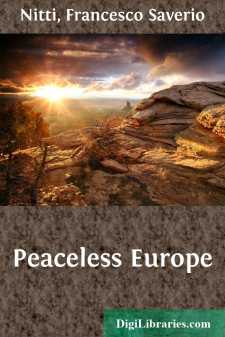Categories
- Antiques & Collectibles 13
- Architecture 36
- Art 48
- Bibles 22
- Biography & Autobiography 813
- Body, Mind & Spirit 142
- Business & Economics 28
- Children's Books 15
- Children's Fiction 12
- Computers 4
- Cooking 94
- Crafts & Hobbies 4
- Drama 346
- Education 46
- Family & Relationships 57
- Fiction 11828
- Games 19
- Gardening 17
- Health & Fitness 34
- History 1377
- House & Home 1
- Humor 147
- Juvenile Fiction 1873
- Juvenile Nonfiction 202
- Language Arts & Disciplines 88
- Law 16
- Literary Collections 686
- Literary Criticism 179
- Mathematics 13
- Medical 41
- Music 40
- Nature 179
- Non-Classifiable 1768
- Performing Arts 7
- Periodicals 1453
- Philosophy 64
- Photography 2
- Poetry 896
- Political Science 203
- Psychology 42
- Reference 154
- Religion 513
- Science 126
- Self-Help 84
- Social Science 81
- Sports & Recreation 34
- Study Aids 3
- Technology & Engineering 59
- Transportation 23
- Travel 463
- True Crime 29
Peaceless Europe
Description:
Excerpt
I
EUROPE WITHOUT PEACE
Is there anyone who still remembers Europe in the first months of 1914 or calls to mind the period which preceded the first year of the War? It all seems terribly remote, something like a prehistoric era, not only because the conditions of life have changed, but because our viewpoint on life has swerved to a different angle.
Something like thirty million dead have dug a chasm between two ages. War killed many millions, disease accounted for many more, but the hardiest reaper has been famine. The dead have built up a great cold barrier between the Europe of yesterday and the Europe of to-day.
We have lived through two historic epochs, not through two different periods. Europe was happy and prosperous, while now, after the terrible World War, she is threatened with a decline and a reversion to brutality which suggest the fall of the Roman Empire. We ourselves do not quite understand what is happening around us. More than two-thirds of Europe is in a state of ferment, and everywhere there prevails a vague sense of uneasiness, ill-calculated to encourage important collective works. We live, as the saying is, "from hand to mouth."
Before 1914 Europe had enjoyed a prolonged period of peace, attaining a degree of wealth and civilization unrivalled in the past.
In Central Europe Germany had sprung up. After the Napoleonic invasions, in the course of a century, Germany, which a hundred years ago seemed of all European countries the least disposed to militarism, had developed into a great military monarchy. From being the most particularist country Germany had in reality become the most unified state. But what constituted her strength was not so much her army and navy as the prestige of her intellectual development. She had achieved it laboriously, almost painfully, on a soil which was not fertile and within a limited territory, but, thanks to the tenacity of her effort, she succeeded in winning a prominent place in the world-race for supremacy. Her universities, her institutes for technical instruction, her schools, were a model to the whole world. In the course of a few years she had built up a merchant fleet which seriously threatened those of other countries. Having arrived too late to create a real colonial empire of her own, such as those of France and England, she nevertheless succeeded in exploiting her colonies most intelligently.
In the field of industry she appeared to beat all competitors from a technical point of view; and even in those industries which were not hers by habit and tradition she developed so powerful an organization as to appear almost uncanny. Germany held first place not only in the production of iron, but in that of dyes and chemicals. Men went there from all parts of the world not only to trade but to acquire knowledge. An ominous threat weighed on the Empire, namely the constitution of the State itself, essentially militaristic and bureaucratic. Not even in Russia, perhaps, were the reins of power held in the hands of so few men as in Germany and Austria-Hungary....


